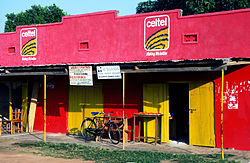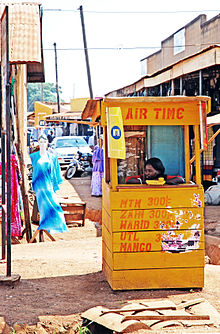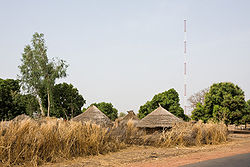- Mobile telephony in Africa
-
Mobile telephony is well spread in Africa just like in the Western World; while in Europe and North America there is a trend towards an average of two cell phones (or two SIM cards) per person, more and more Africans own cell phones. The percentage keeps increasing year after year. Furthermore, the African mobile telephony market has been growing at a fast rate since the 2000s: between 2004 and 2007, for example, this growth has been three times the world's average.[1] Mobile telephony is already both more widespread (in terms of number of subscribers) and more profitable than POTS (fixed-line) telephony.
Contents
Growth of mobile telephony in the 2000s
Several factors contributed to the "boom" of mobile telephony in Africa in the 2000s.
Limitations of African PSTNs
A major success factor of mobile telephony in Africa is the scarce diffusion of PSTNs (fixed line networks). In 2000, Sub-Saharan Africa as a whole had less telephone lines than Manhattan alone. Fixed line networks hardly reach the remote rural areas where a relevant percentage of the African population lives. Of about 400.000 rural settlements that are estimated to exist in Africa, less than 3% have PSTN access. Mobile telephony providers have taken advantage of this situation, implementing a very aggressive diffusion strategy for mobile networks. In 2006, 45% of rural settlements in Africa had GSM coverage. More recently, coverage has reached 90% of the territory in several countries, including Comoros, Kenya, Malawi, Mauritius, Seychelles, South Africa, and Uganda. Other countries that in 2007 reached above 50% of GSM coverage are Botswana, Burkina Faso, Burundi, Cape Verde, Guinea, Namibia, Rwanda, Senegal, Swaziland, and Togo.[2] As a consequence of the larger diffusion of GSM networks over fixed line networks, "mobile-telephone booths" are common in some areas of Africa.
The fixed line market in Africa is generally based on monopoly (often state monopoly), with a few number of incumbent operators who did not invest in spreading their networks much farther than the larger urban areas. While this situation is changing (for example, both Telecom Kenya and Botswana Telecomunnications Corporation have recently been privatized, and a market liberalization strategy has been initiated in several countries[2]), the mobile telephony market is generally more competitive and dynamic.[2]
The table below outlines the percentage of African countries where telecommunications markets (fixed line telephony, mobile telephony, Internet) are fully competitive, partially competitive, or monopolistic, either de iure or de facto (data refer to 2007).[2]
Internet Mobile Fixed line Monopolistic 10 9 55 Partially competitive 12 41 23 Fully competitive 69 43 25 Market strategies
Mobile telephony providers that introduced mobile telephony in Africa in the 2000s adopted business models explicitly designed to reach the poorest (and largest) section of the population, with low-priced mobile phones and small denomination prepaid cards.[2]
Another key success factor in the providers' strategy in Africa has been the cutting down of roaming costs. This is especially relevant in Africa since strong relationships often hold between neighbouring communities that happen to be separated by national borders.[2] Celtel was the first operator to provide free roaming with the 2006 One Network campaign, whereby roaming became free between Uganda, Kenya, and Tanzania. In 2007 this has been extended to Gabon, DR Congo, Congo-Brazzaville, Burkina Faso, Chad, Malawi, Niger, Nigeria, and Sudan.[3] After Celtel, other providers operating in African markets have announced their intent to gradually reduce and eventually abolish roaming costs for certain areas.
Current situation
As a consequence of the booming of mobile telephony in the 2000s, Africa now contributes for about 7% of the world's mobile market. In 2006, Africa had 198 million mobile telephony subscribers,[2] and in January 2008, Kenya had more than 10 million active mobile telephone numbers.
The table below depicts the number and growth of subscriptions, in 2005-2006, for the 10 main mobile telephony provides in Africa.[2]
Provider Country Subscribers (2005)
(thousands)Subscribers (2006)
(thousands)Growth % Airtel Kenya, Uganda 37600 31800 54.9 Vodacom South Africa 17600 21800 23.9 MTN South Africa 10235 12483 22 MTN Nigeria 8370 12281 47 Glo Mobile Nigeria 9000 11000 22 Maroc Morocco 8237 10707 30 Djezzy Algeria 7109 10531 48 Mobinil Egypt 66960 9267 38 Vodafone Egypt 6125 8704 42 Mobilis Algeria 4908 7476 52 Celtel Nigeria 5400 6400 18 Mobile telephony and Internet
As a consequence of the wider availability of mobile telephony with respect to fixed telephony, in many African countries most Internet traffic goes through the mobile network. An example is Seychelles, that is the African country with a larger percentage of Internet subscribers, where most Internet users access the net through the mobile network.[2]
Nevertheless, Internet access trough the GSM is very slow (9.6 kbps). The advent of 2.5G and 3G networks did not really affect the African market as terminals are more costly, video telephony is emphasized with respect to data transmission, and many African governments have been slow or ineffective in defining their UMTS licencing strategy. In perspective, it is likely that the key to the diffusion of Internet in Africa in the future will be Broadband Wireless Access technologies such as WiMAX technology.[2]
Footnotes
References
- Darren Waters (2007), Africa waiting for net revolution. «BBC News» October 29, [1]
- ITU (2007), Telecommunications/ICT Markets and Trends in Africa, [2]
- Reuters (2008), Celtel Expands Free Roaming Network to 12 African Nations, [3]
See also
Categories:- Science and technology in Africa
- Economy of Africa
Wikimedia Foundation. 2010.



